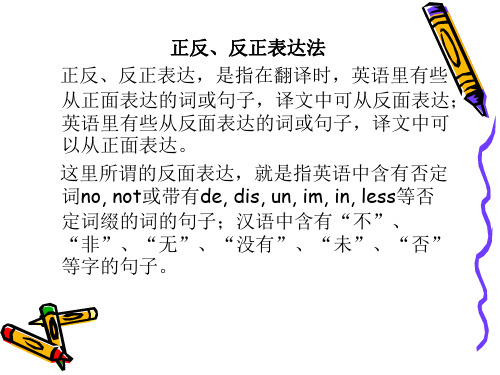正反、反正译法
第十讲 正反、反正表达法

“反译” 的分类
词语的反译 语言差异决定的反译
运用技巧的反译
1. 词语中的反译
a barren tract of land be at a loss be fatally ill safe and sound
不毛之地 不知所措 不可救药
安然无恙/万无一失
with dignity
不卑不亢
1. 词语中的反译
1.2英语原文使用了no, not等否定词
• The research group lost no time in carrying out their new plan. • 研究小组抓紧时间/争分夺秒执行了他们的 新计划。
2.1 英语原文带有显形否定词语、短语
• If you fail to prepare, • you prepare to fail. • 不认真准备,就准备不及格/失败吧。
2. 语言差异决定的反译
• 3)否定句译成肯定句 • I couldn’t feel better. • 我感觉好极了。
3.说 1.1 英语原文含有否定意义词缀的单词 1.2 英语原文使用了no, not等否定词 • 2、英语正说,反译成汉语反说 2.1 英语原文带有显形否定词语、短语 2.2 英语原文带有隐形否定词语、短语
• 点评:
• 英文句子中含有否定意义词缀的单词大多 数可以从正面着笔。如讲disorder不翻译 成“无序状态”,而翻译成“乱七八糟”, 两者意思一样,但从正面着笔更加顺畅。
1.1 英语原文含有否定意义词缀的单词
• Hitler’s undisguised effort to persecute the Jews met with worldwide condemnation.
6被动及正反译

Like the Los Angeles Olympics, Mexico’s World Cup is funded by private business. 同洛杉机奥运会一样,墨西哥世界杯大赛也是 同洛杉机奥运会一样,墨西哥世界杯大赛也是 私人企业出钱资助的 由私人企业出钱资助的。 An invitation to come to the home for a meal or a longer visit is usually given by the hostess. 通常,邀请客人到家吃饭或作较长时间访问, 通常,邀请客人到家吃饭或作较长时间访问, 女主人出面的 是由女主人出面 都是由女主人出面的。
隐性否定词(p85)
This is the last place where I expected to meet you. 怎么也没料到会在这里见到你 料到会在这里见到你。 我怎么也没料到会在这里见到你。 We regret to learn that you have failed in obtaining the license. 得知你方未能获得许可证,深表遗憾。 未能获得许可证 得知你方未能获得许可证,深表遗憾。 Owing to the absence of any news from you, we have sold the goods elsewhere. 由于没有得到你方任何消息, 没有得到你方任何消息 由于没有得到你方任何消息,我们已将该货另 售别处。 售别处。
I was startled when the menu was brought, for the price were a great deal higher than I had expected. 侍者送来了菜单, 侍者送来了菜单,一看价格比我预期的高 送来了菜单 得多,我不禁吓了一跳。 得多,我不禁吓了一跳。
第九节 正反、反正翻译法

(四)名词 1.It was said that someone had sown discord among them. 据说有人在他们中间挑拨离间。 2.Generally she accepted the family life in all its crowded inadequacy. 在通常情况下,她还是能忍受她那拥挤寒 碜的家庭生活的。 3.He took an instinctive dislike to the woman. 他本能地讨厌那女人。
正反、反正表示法
• (三)形容词 • We are watching the fluid situation with concern. • 我们关注着动荡不安的局势。 • Appearance is deceptive. • 外表是靠不住的。 • But I stood firm.(P191 line2) • 但是我丝毫没有退步。
正反、反正表示法
Байду номын сангаас
• • • •
(二)副词 We may safely say so. 我们这样说错不了。 They resumed(重新占用) their seats moodily (易生气地). • 他们又不愉快地坐了下来。 • We live meagerly(贫乏地), but as the same time, we blessed in many ways. • 我们生活并不富裕,但在很多方面我们又 是幸运的。
(六)名词
句子中含有否定语气的名词,可译为否定句。这类名词如: defiance (不顾,无视) denial (否认,否定) exclusion (排除) freedom (不,免除) lack (无,缺乏) failure (不成功,不足,不履行) refusal ( 不愿,不允许) loss (失去)
正反反正译法

If you refuse to follow my advice, you must take the consequences. 如果你不听我的劝告,后果由你负责。 Now that the boy was earning his own living, he could defy his father's strict rules. 如今男孩已自立更生,他可以不受父亲的严厉管束。 I know he wanted to bootlick me, but I ignore him. 我知道他想要拍我马屁,但我才不吃那一套。
名词
The machine has two serious disadvantages. 那台机器有两个严重缺陷。 The dishonesty of the city officials was exposed by the newspaper. 市政府官员们的欺诈行为在报纸上披露出来。
短语
To be or not to be, that is the question. 生存还是毁灭,这是值得考虑的。 There is nothing like mineral water to quench one’s thirst. 矿泉水是解渴的最好饮料。
bootlick: try to gain favor by cringing or flattering 拍马屁,谄媚
take the consequences: 承担后果
名词
We were perplexed by his failure to answer the letter. 他何以不覆信, 我们大惑不解. Shortness of time has required the omission of some states. 由于时间不够,没能访问某些国家。
正反表达英语翻译

16、Those who fear the influence of television deliberately underplay its persuasive power, hoping that they might keep knowledge of its potential to effect social change from being widely disseminated. 那些害怕电视影响力的人故意贬低电视的说服 力,不希望电视影响社会的潜力得以广泛传播。
1、He was an indecisive sort of person and always capricious. 他这个人优柔寡断,而且总是反复无常。 2、Out of sight, out of mind. 眼不见,心不念。 3、My husband missed the last bus, so he had to go home on foot. 我丈夫没有赶上末班公共汽车,所以只好步 行回家。 4、In the high altitude snow and ice remain all year. 高海拔的地方,冰雪终年不化。
英语语句翻译方法

英语语句翻译方法英语语句翻译方法有哪些?翻译其实只要掌握了方法并不难,看看下面吧!一、正反、反正表达法i.汉语从反面表达,译文从正面表达例1:他提出的论据相当不充实。
译文:The argument he put forward is pretty thin. (词) 例2:我们确信,年轻一代将不会辜负我们的信任。
译文:We are confident that the younger generation will prove worthy ofour trust. (短语)例3:他七十岁了,可是并不显老。
译文:He was 70, but he carried his years lightly. (句子)II.汉语从正面表达,译文从反面表达例1:他这个人优柔寡断,而且总是反复无常。
译文:He was an indecisive sort of person and always capricious. (词)例2:调查结果清清楚楚地显示病人死于心脏病。
译文:The investigation left no doubt that the patient had died of heartdisease.(短语)例3:这类举动迟早会被人觉察的。
译文:Such actions couldn’t long escape notice. (句子) III.特殊的否认句式例1:有利必有弊。
译文:There is not any advantage without disadvantage. (双重否认)例2:我们在那个城市从未因为是犹太人而遭受歧视。
译文:In that city, we had never suffereddiscrimination because we wereJews. (否认转移)二、分句、合句法I.分句法汉译英时,需要分译的句子多数是长句,或者是构造复杂的复句。
这种句子如果译成一个长句,就会使译文冗长、累赘、意思表达不清楚,也不符合英文习惯。
7正反、反正译法

【译文】凡是活在世上的人都曾有过神仙般 的几段绝好时光。(双重否定表示强烈肯定)
12
例5:The significance of these incidents wasn’t lost on us.
【译文】这些事引起了我们的重视。
例6:He has no small chance of success.
【译文】她忍住没有笑。
例5:The thick carpet killed the sound of my footsteps. 【译文】我走在厚厚的地毯上一点儿声 音也没有。
18
例6:The pursuit of science withdraws interest from external things. 【译文】科学家由于致力于科学研究, 对外界事物总是不感兴趣。 例7: My guess is as good as yours. 【译文】我的猜测并不比你的高明。
14
课堂互动1: 翻译句子, 注意否定译肯定
1.Students, with no exception, are to hand in their papers this afternoon. 【译文】今天下午,学生统统要交上书面作业。 2.Styles come and go, but good taste is timeless. 【译文】文风随时在变,而文雅是永恒的。 3.All the articles are untouchable in the museum. 【译文】博物馆内一切展品禁止触摸。 4. No one has nothing to offer to society. 【译文】人人对社会都有所贡献。(双重否定用 来表示强烈肯定)
英汉互译理论与实务课件:正反反正译法

4.正反反正的翻譯策略
• 1)反話正說 (英漢) • 例3:No pains, no gains. • 譯文:一份耕耘,一份收穫。 • 例4:A learned man is not above asking. • 譯文:有學問的人總是虛心求教別人。 • 例5:A big elephant is not more an animal than a little
• 例2:When John was introduced to the old couple, they said simply, “We’ve read your article. We expected to meet an older man.”
• 譯文:當有人把約翰介紹給這對老年夫婦時,他們只是淡淡 地說:“我們看過你的文章,沒想到你這麼年輕。”
• 副詞:hardly, rarely, seldom, barely, out, too…to, in vain…
• 介詞:beyond, without, above, except, save, but, instead of …
• 連詞:before, unless, or, other than, rather than… • 4) 採用句法手段: • before, unless, or, other than, rather than…
• 原文“expected to meet an older man”是從正面來表達,譯 文運用反譯法,改從反面來表達“沒想到你這麼年輕”,一 來使語義更加清晰,二來也增強了其語言效果。
3.正反反正譯法的功能
• 正反反正譯法的使用可以使語義表達更加清晰, 同時很大程度上可以增強譯文的修辭效果。譯者 必須在準確理解原文的基礎上,根據譯入語的行 文習慣和修辭效果,靈活運用正說與反說,使譯 文的表達儘量符合譯入語讀者的思維方式和表達 習慣。
- 1、下载文档前请自行甄别文档内容的完整性,平台不提供额外的编辑、内容补充、找答案等附加服务。
- 2、"仅部分预览"的文档,不可在线预览部分如存在完整性等问题,可反馈申请退款(可完整预览的文档不适用该条件!)。
- 3、如文档侵犯您的权益,请联系客服反馈,我们会尽快为您处理(人工客服工作时间:9:00-18:30)。
I’ll do it now before I forget it. 趁还未忘记,我现在来做这件事。 趁还未忘记,我现在来做这件事。 我要在忘记之前了来做这件事。) (我要在忘记之前了来做这件事。) I love you more than I could say. 我说不出多么爱你。(我爱你超过我能够说的。) 。(我爱你超过我能够说的 我说不出多么爱你。(我爱你超过我能够说的。) Be sure to lock the door when you leave. 忘记锁好门。(你离开时一定要锁好门。) 。(你离开时一定要锁好门 离开时不要忘记锁好门。(你离开时一定要锁好门。) His explanation is far from being satisfactory. 令人满意。( 。(他的解释距离令人满意的 他的解释根本不能令人满意。(他的解释距离令人满意的 程度很远。) 程度很远。)
She is no less diligent than her sister. 她和她姐姐一样用功。 她和她姐姐一样用功。 Such things couldn’t long escape notice. 这类事情迟早会被人发觉的。 这类事情迟早会被人发觉的。 We did not notice this matter until yesterday. 直到昨天我们才注意到这件事。 直到昨天我们才注意到这件事。 We can not be too careful in doing experiments. 我们做实验越仔细越好。 我们做实验越仔细越好。
(一)英译汉正说反译法:英语从正面表达, 英译汉正说反译法:英语从正面表达, 汉语从反面表达
正反译是用变换语气的方法把原文的肯定式译成 汉语的否定式。 汉语的否定式。翻译时运用这一方法可使译文合乎 汉语规范,更恰当地表达原文的意思。 汉语规范,更恰当地表达原文的意思。 例如, 可译成“没有毛病” 例如 correct 可译成“没有毛病”,wonder可译成 可译成 不知道” 可译成“ “不知道”,exactly可译成“一点不错”,anything 可译成 一点不错” but可译成“一点也不”等等。 可译成“ 可译成 一点也不”等等。
正反、 正反、反正译法
什么是正说和反说? 什么是正说和反说?
英语词句中还哪有never, no, not, non-, un-, in-, 英语词句中还哪有 im-, ir-, -less等成分以及汉语词句中含有不、无、 等成分以及汉语词句中含有不、 等成分以及汉语词句中含有不 勿等成分的为“ 未、甭、别、休、莫、非、毋、勿等成分的为“反 不含有这些成分的为“正说” 说”,不含有这些成分的为“正说”。
(二)英译汉反说正译法:英语从反面表达, 英译汉反说正译法:英语从反面表达, 汉语从正面表达
反正译是用变换语气的方法把原文的否定式译成 汉语的肯定式。 汉语的肯定式。翻译时运用这一方法可使译文自然 流畅。 流畅。 英语中含有否定词语的结构和双重否定的结构常有 这种方法来解释。 这种方法来解释。英语中表达否定意思的词或词组 指带有de-, dis-, im-, in-, un-, less-等词缀的词和 指带有 等词缀的词和 no, not, not…until, no less than, no more than, Nothing than, nothing but, cannot…too 等表示 否定的词或词组。 否定的词或词组。
Excuse me. 。(原谅我 原谅我。) 对不起。(原谅我。) Wet paint! !(湿油漆 湿油漆。) 油漆未干!(湿油漆。) Keep off the lawn. 践踏草坪!(离开草坪。) !(离开草坪 请勿践踏草坪!(离开草坪。) Appearances are deceptive. 住的。(外表是容易使人误解的。) 。(外表是容易使人误解的 外表是靠不住的。(外表是容易使人误解的。) The weather is keeping dry. 。(天气一直干燥 天气一直干燥。) 天老不下雨。(天气一直干燥。) My guess is as good as yours. 我的猜测并不比你的高明。(我的猜测和你的一样。) 我的猜测并不比你的高明。(我的猜测和你的一样。) 。(我的猜测和你的一样
Never too old to learn. 活到老,学到老。 活到老,学到老。 I couldn’t agree more about it. 我对此非常赞同。 我对此非常赞同。 His story was nothing but lies. 他的那番话纯粹是谎言。 他的那番话纯粹是谎言。 Our advice was not lost on him. 我们的劝告对他起了作用。 我们的劝告对他起了作用。 There is no rule but exceptions. 凡规则总有例外。 凡规则总有例外。 Don’t lose time in posting this letter.பைடு நூலகம்赶快把这封信寄出去。 赶快把这封信寄出去。
